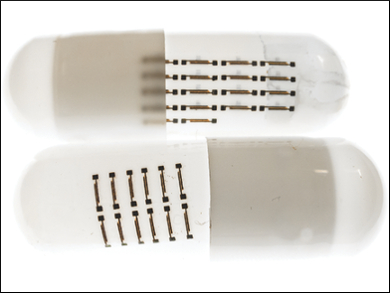Point-of-care testing is medical diagnostic assaying at or near the place of patient care, which permits real-time diagnostics for rapid and more efficient clinical management decisions. Edible electronic devices which can be safely ingested and operate from within the gastrointestinal tract could boost point-of-care testing. So far, however, ingestible electronics based on inorganic technologies are often bulky and require cumbersome and costly fabrication processes.
Guglielmo Lanzani, Politecnico di Milano and Istituto Italiano di Tecnologia, both Milano, Italy, Mario Caironi, Istituto Italiano di Tecnologia, and colleagues have developed organic field-effect transistors (OFETs) that can be transferred onto edible substrates such as pills or food. The researchers used temporary tattoos consisting of ethylcellulose (EC) layers, which were attached to a paper sheet with starch. Upon exposure to water, the starch dissolved and the EC layers detached from the paper sheet.
The team inkjet-printed both n- and p-type polymer semiconductors, e.g. poly(3-hexylthiophene), onto the temporary tattoo paper to produce OFET electrodes. After lamination with an additional EC layer, the OFETs could be transferred onto hard-gelatine capsules to form an organic edible electronic device (pictured).
- Tattoo-Paper Transfer as a Versatile Platform for All-Printed Organic Edible Electronics,
Giorgio E. Bonacchini, Caterina Bossio, Francesco Greco, Virgilio Mattoli, Yun-Hi Kim, Guglielmo Lanzani, Mario Caironi,
Adv. Mater. 2018.
https://doi.org/10.1002/adma.201706091

